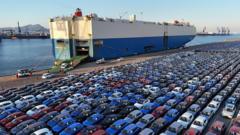**As President Trump prepares to unveil new tariffs, businesses brace for changes that could affect international trade dynamics significantly.**
**Trump's Upcoming Tariff Announcements: Key Unknowns Explored**

**Trump's Upcoming Tariff Announcements: Key Unknowns Explored**
**The uncertainty surrounding the imminent 'Liberation Day' tariffs from the Trump administration raises questions about their potential impact on global trade.**
In a move that has captured the attention of businesses and global markets, President Donald Trump has indicated that new tariffs are on the horizon. Dubbed "Liberation Day" by the White House, the announcement is expected to bring forth a set of import duties that could reshape the landscape of international trade. However, specific details about the extent and timing of these tariffs remain largely unknown.
One of the primary questions is the magnitude of the tariffs being proposed. While the Trump administration has not provided explicit rates, there have been varied predictions from analysts. During his campaign, Trump floated the idea of a 10% blanket tariff on all imports, and on occasions mentioned even more substantial rates, specifically for goods coming from China, with figures as high as 60% cited. The concept of "reciprocal" tariffs has also come into play, suggesting that import taxes would vary based on the tariffs imposed by other countries.
The introduction of these tariffs has led to significant unease among businesses preparing for potential increases in costs. Industries, particularly in Europe, are bracing for the imposition of double-digit tariffs, with a possible 25% duty targeted at EU imports noted earlier in the year. Countries such as the UK had hoped for exemptions, but indications from the Trump administration suggest a more expansive application, potentially impacting a broad array of nations.
Another area of speculation is the specific nations that will be affected by the tariffs. The Trump White House has hinted that all countries may be included in this new regime, stifling hopes that some allies could escape unharmed. Focus has reportedly been on a group of nations dubbed the "Dirty 15," identified as significant U.S. trading partners that impose tariffs or policies detrimental to American firms.
The economic implications of these tariffs are critical. They represent a tax on imports, meaning U.S. firms will face increased costs when bringing goods into the country. Businesses may respond by switching suppliers, negotiating shared burdens with partners, or, notably, raising prices for American consumers. This leads to concerns about consumer behavior, as potential price increases could reduce demand and push the U.S. economy closer to recession.
Trump's assertion that companies can mitigate tariffs by relocating operations to the U.S. fails to recognize the complexities involved in such decisions, including high operational costs and changing currency dynamics. As companies navigate this evolving landscape, the decisions made following the announcement on Wednesday are likely to have lasting impacts on global trade, economic policy, and international relations. The ripple effects of these tariffs could unfold in unexpected ways well beyond Trump's anticipated announcement.
One of the primary questions is the magnitude of the tariffs being proposed. While the Trump administration has not provided explicit rates, there have been varied predictions from analysts. During his campaign, Trump floated the idea of a 10% blanket tariff on all imports, and on occasions mentioned even more substantial rates, specifically for goods coming from China, with figures as high as 60% cited. The concept of "reciprocal" tariffs has also come into play, suggesting that import taxes would vary based on the tariffs imposed by other countries.
The introduction of these tariffs has led to significant unease among businesses preparing for potential increases in costs. Industries, particularly in Europe, are bracing for the imposition of double-digit tariffs, with a possible 25% duty targeted at EU imports noted earlier in the year. Countries such as the UK had hoped for exemptions, but indications from the Trump administration suggest a more expansive application, potentially impacting a broad array of nations.
Another area of speculation is the specific nations that will be affected by the tariffs. The Trump White House has hinted that all countries may be included in this new regime, stifling hopes that some allies could escape unharmed. Focus has reportedly been on a group of nations dubbed the "Dirty 15," identified as significant U.S. trading partners that impose tariffs or policies detrimental to American firms.
The economic implications of these tariffs are critical. They represent a tax on imports, meaning U.S. firms will face increased costs when bringing goods into the country. Businesses may respond by switching suppliers, negotiating shared burdens with partners, or, notably, raising prices for American consumers. This leads to concerns about consumer behavior, as potential price increases could reduce demand and push the U.S. economy closer to recession.
Trump's assertion that companies can mitigate tariffs by relocating operations to the U.S. fails to recognize the complexities involved in such decisions, including high operational costs and changing currency dynamics. As companies navigate this evolving landscape, the decisions made following the announcement on Wednesday are likely to have lasting impacts on global trade, economic policy, and international relations. The ripple effects of these tariffs could unfold in unexpected ways well beyond Trump's anticipated announcement.























